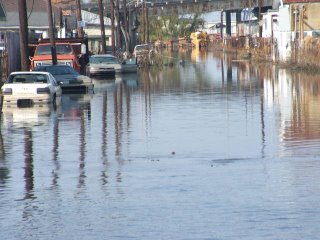
I like New Orleans, it's probably one of the oldest European founded cities in the country, and if anybody who's been there is to be believed (I never been farther south than Kansas City) it's got it's own, great culture. But it's also got a logistical problem: Mother Nature intended for most of New Orleans to be under a considerable amount of water (as I understand it, the only part above sea level is the "crescent" along the river that the French originally built). I feel that, while a bad thing, Katrina did give us the best opportunity we'll ever see for letting nature put the ocean back where it belongs.
Most logical people realize that land which is under sea level and within spitting distance of the ocean isn't worth the risk. Somewhere along the line, somebody who wasn't logical built a couple levees and a city where a city had not business being. People moved in, and every few years I'd see a documentary on how a big storm could wipe out New Orleans. Nobody cared though. Katrina changed all of that, and took the decision out of our hands. Now it's time to recognize that the hard part (getting out of New Orleans) has been done for us, and we just need to tie up the loose ends and we'll be rid of our (up until recently) death defying, sub sea level experiment.
All of this doesn't mean that I hate the people of New Orleans. If my house was flattened by a tornado, I'd hole up in the basement until it was over, then I'd camp out in my back yard and rebuild on the old foundation. If my house was somehow flooded (not likely since I live on a hill) I'd sit in the attic, with a boat ready to go if it was bad enough. My point is, I can understand why people want to go back to their homes in New Orleans, because I'd feel the same way. But I don't live in New Orleans, I live in Iowa on land that is quite a distance from any significant water (the great lakes are probably the closest) and quite a bit above sea level. I'll probably still have dry land even when the ice caps melt in a few years. The same can't be said for the crescent city.
There's also a considerable environmental reason to let New Orleans die in peace. Since the Mississippi River existed, it has carried silt to the delta in Louisiana to replace the land carried out to sea by various natural occurrences. When man came along and changed that rule, the wetlands along the Louisiana coast just began to slowly disappear, and the raging ocean could get a lot closer to centers of population. Even after Katrina (I think, but definitely before) the state of Louisiana was shrinking at an alarming rate. Let the river work it's magic (and God knows there's plenty of dirt in the Mississippi) and the buffer zone of wetlands will come back and do its job.
We have an opportunity here. Even if you just move the city a couple of miles inland, stop building a city on a lakebed that's only dry as long as conditions are ideal and the levee holds. People weren't meant to defy nature, and we're already getting away with more than we should.






